Fire or life threatening emergencies: 000
Emergency Information: 13 3337
SES Emergency Assistance: 132 500
The coastline between Exmouth and Broome is one of the most cyclone-prone in Australia. Tropical cyclones typically cross this stretch of coast between November and April each year so it’s important to be prepared.
Not all cyclones are created equal. While some are relatively weak and cause only minor damage, others can be truly destructive.
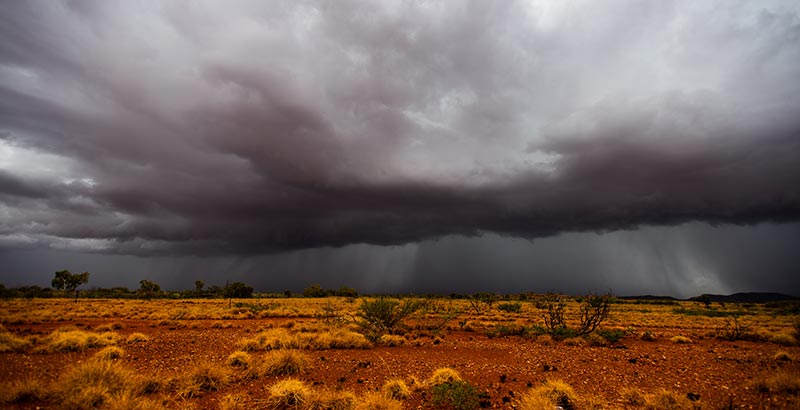
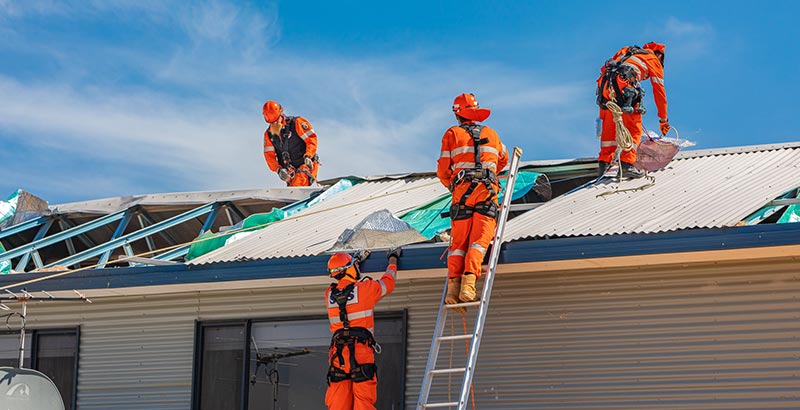
Even if a cyclone is de-escalated before crossing land, it doesn’t mean the threat isn’t real. It can still bring destructive winds, torrential rainfall, flooding and dangerous storm surge .
Most cyclones will also bring heavy swells to the coast and dangerous wind and flooding to inland communities.
Your safety is your responsibility. Get prepared and stay informed during cyclone season.
When a cyclone forms quickly there may not be much time to prepare yourself or your property. It’s important to create a personalised emergency plan on Emergency WA before disaster strikes. You’ll have a better chance of reducing damage and injury if everyone knows what to do and your property is well maintained.
The emergency planning tool within Emergency WA allows you to prepare for a range of hazards including bushfires, cyclones, floods and storms.
If you link your plan to a watch zone in the app, you’ll receive instant notifications when a cyclone hits. The app will guide you through your plan, cutting out indecision when seconds matter.
When creating your plan, keep these questions in mind:
Prepare for a cyclone now and keep yourself and your household safe.
As of 15 July 2024, WA’s cyclone warnings have changed. We’re no longer using the old Blue, Yellow, Red Alert and All Clear system. There are now three warning levels which move up and down to reflect the risk to your life or property before, during and after a cyclone. Learning these three levels and how to respond to them could save your life. For the latest information visit Emergency WA.
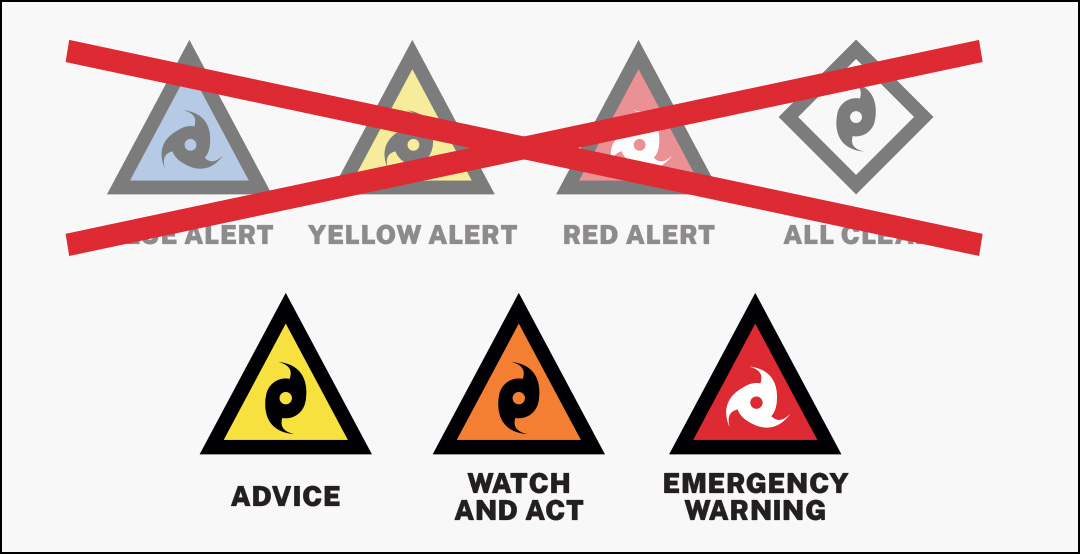
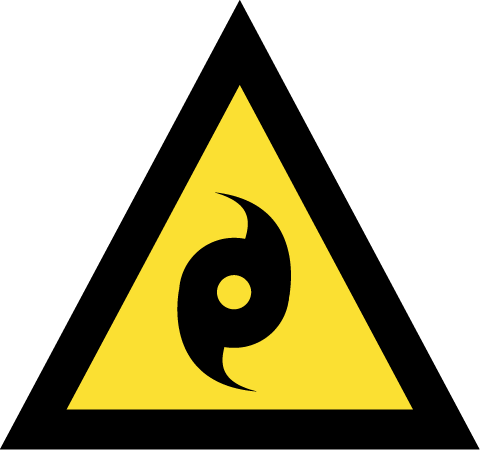
What to do:
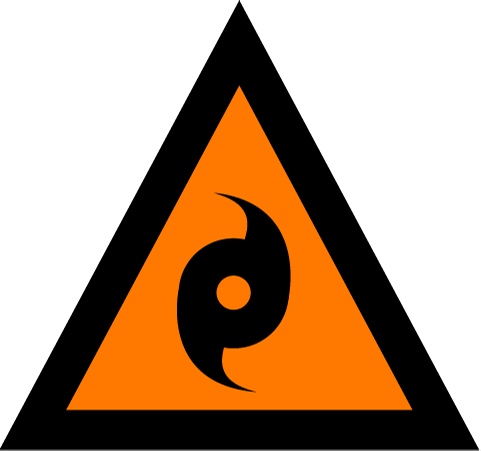
What to do:
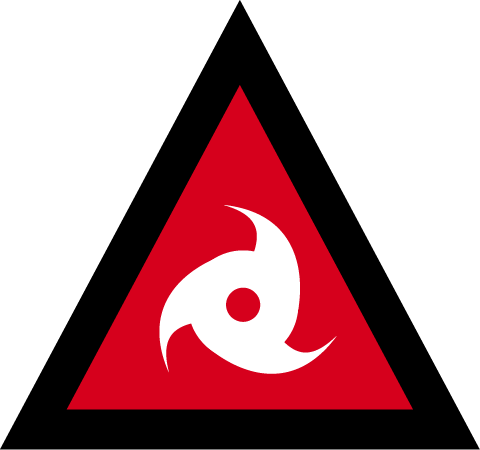
What to do:

What to do:
If your home is damaged:

What to do:
Tip: Remember, even if a cyclone is de-escalated, torrential rain, strong winds and storm surge can still cause flooding.
An emergency kit provides essential items for your family’s short-term survival and should be stored it in an easy-to-grab place.
Remember when packing your kit that you may be without power and water for several days or weeks after a cyclone, and shops may not be open.
For more information and in-depth planning, refer to the emergency kit checklist.
Call 13 DFES: 13 3337
Listen to ABC local radio
Main Roads WA or call 138 138
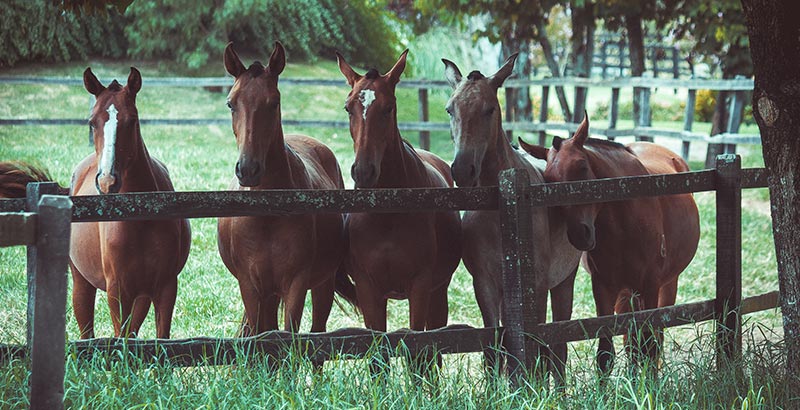
When preparing your family and property for natural disasters, you also need to consider your pets and livestock.
Ensure that your pets are properly identified with a name tag or microchip or that you have a recent photo of them with you, and that stock registers for your livestock are current.
Find out more about pet and livestock welfare in an emergency by visiting the Department of Primary Industries and Regional Development website.
You can also ask your local government if there are pet or livestock welfare arrangements in place during an emergency.
The best way to protect your pet is to move them to a safer area in advance. This may mean taking them to relatives, friends, animal boarding facilities or to a temporary animal shelter or evacuation centre which accepts animals.
When relocating your pets make sure you supply make sure that you supply:
Find out more about caring for pets in a natural disaster here.
If you don't have a pre-arranged evacuation site for your animals, head to your local council evacuation location and request further information when you get there.
It is important to have a plan to care for livestock. Planning to leave early is the best way to ensure their safety.
When moving livestock, you should consider:
You can find out more about caring for livestock during an emergency here.
If you are unable to move your pets in advance and are unable to take them with you, take the following precautions to help keep them safe:
Trained assistance dogs
Trained and accredited guide and assistance dogs will be allowed to stay in emergency shelters with their owners. Those accepted will require appropriate evidence of registration, accreditation, and identification.
Prepare your home and property well before cyclone season commences. For more information, refer to the Tropical Cyclone Preparedness Guide.
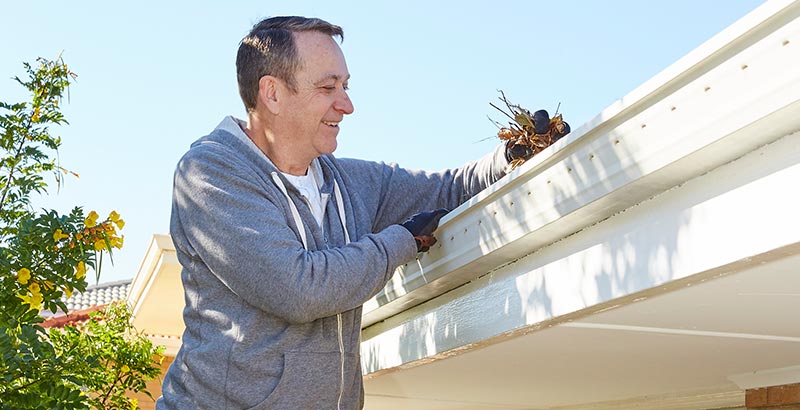
Don’t let your trip north, go south.
Summertime in the south means cyclone season in the north.
From November to April, cyclones hit the Pilbara and Kimberley regions, and the Midwest Gascoyne often floods as the weather moves south.
This means that if you are travelling the pristine coastline of northern WA during summer, you will need to prepare before you go and know how to stay informed in the event of a cyclone when you get there. Your safety is your responsibility.

When a cyclone forms quickly there may not be much time to prepare yourself. If you are camping, travelling with a caravan or in a house that will not withstand forecast winds, flooding and storm surge, you must evacuate. Leave to a safer location before an Emergency Warning is issued. Leaving at the last minute is dangerous as your planned route may be closed or blocked off by hazards including fallen trees or fast flowing water.
Before you travel, it’s important to create a personalised emergency plan on Emergency WA and know how to stay informed when you get there. You’ll have a better chance of reducing damage and injury if everyone knows what to do.
The emergency planning tool within Emergency WA allows you to prepare for a range of hazards including bushfires, cyclones, floods and storms.
If you link your plan to a watch zone for your travel destination in the app, you’ll receive instant notifications when a cyclone hits. The app will guide you through your plan, cutting out indecision when seconds matter.
When creating your plan, it’s important to also create an emergency kit. You should pack your emergency kit before leaving and take it with you on your trip. An emergency kit provides essential items for short-term survival during an emergency.
At a minimum, your emergency kit should include the following:
You should also have any special medical supplies or equipment easily accessible in case a cyclone is forecast.
Prepare for a cyclone now and keep yourself and your household safe.
When a cyclone is forecast, the best option is to leave the area.
If you cannot leave, you must keep up to date and follow the latest information on Emergency WA.
As of 15 July 2024, WA’s cyclone warnings have changed. We’re no longer using the old Blue, Yellow, Red Alert and All Clear system. There are now three warning levels which move up and down to reflect the risk to your life or property before, during and after a cyclone. Learning these three levels and how to respond to them could save your life. For the latest information visit Emergency WA.


What to do:

What to do:

What to do:

What to do:
If your home is damaged:

What to do:
Tip: Keep informed by visiting Emergency WA or listening to your local ABC radio station. Remember, even if a cyclone is de-escalated, torrential rain, strong winds and storm surge can still cause flooding.
Things to note: Airports may be closed when a cyclone threatens, so it’s essential to contact your airline early.
If you are travelling in an area likely to be impacted by a cyclone, it is essential to relocate early to a safe place.
Talk to your accommodation provider about whether the accommodation can withstand a cyclone or if you will need to evacuate to a safer location. If you do need to evacuate, they will also be able to provide you with information about the best route to take.
If a cyclone impacts the area, make sure you have five days of supplies, including medications, food and water.
Caravans, motorhomes and campervans do not provide safe shelter from the high winds and heavy rains that a tropical cyclone brings. You may not be able to tie down or anchor your caravan at a local caravan park. Additionally, roads and tracks can quickly become blocked by debris, making it difficult to leave the area.
Camping in an area that a tropical cyclone will impact is also unsafe. If you are planning on camping remotely or in a caravan park during cyclone season, it is your responsibility to stay informed about the cyclone and any forecast for flooding, storm surge or destructive winds so you can relocate early and stay safe.
Remember, service stations are limited in the North West. In the event of a cyclone, queues will be long and fuel supplies may be interrupted. Keep your tank as full as possible during your trip and carry spare fuel.
Flooding causes the most deaths during cyclones!
When travelling by caravan, motorhome, or campervan do not try to cross flooded roads, as this can be very dangerous.
Even If a cyclone is de-escalated before it hits land, torrential rain, strong winds, and storm surge can still cause flooding.
Don’t get caught out in floodwaters.
Call 13 DFES: 13 3337
Listen to ABC local radio
Main Roads WA or call 138 138
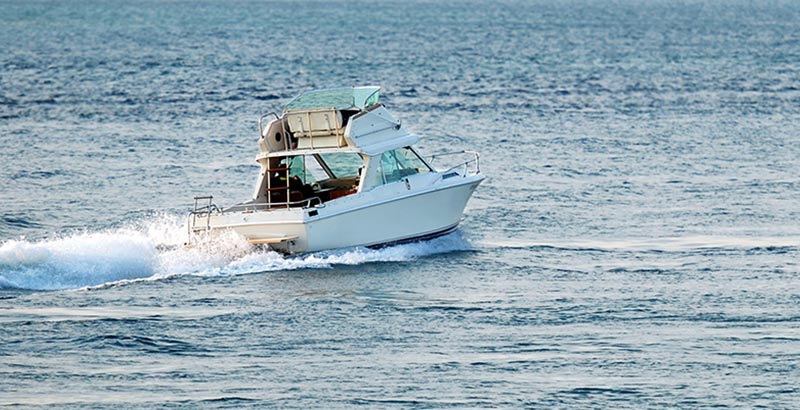
Cyclones pose a serious threat to boating due to destructive winds, torrential rainfall and flooding. Cyclones can also lead to storm surge, Storm surge is an abnormal rise in sea level over and above the normal tide levels. It can cause flooding. heavy swells and storm tides.Storm tide is the water level that results from the combination of the storm surge and the normal tide. It can flood low-lying areas sometimes for kilometres in land. All of these factors can combine to create a dangerous situation for boats and boat owners. To reduce the risk of damage, injury, or even death, it is essential to take precautions before a cyclone hits.
If you own or operate any boat, you must be prepared for a cyclone.
Your safety is your responsibility:
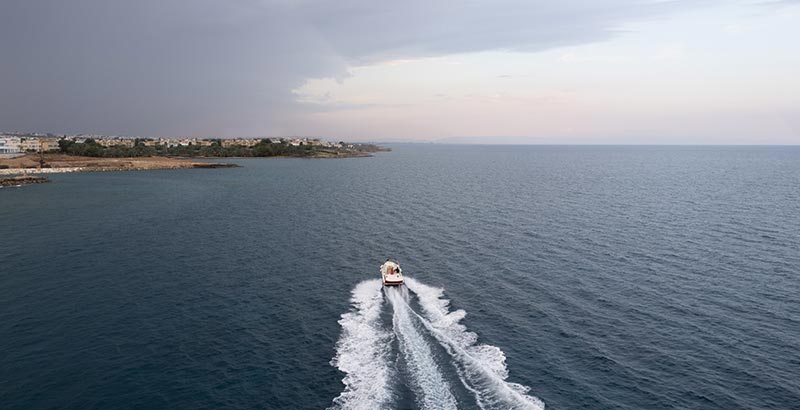
Plan to move your boat out of the water or area affected by a cyclone to a safer location. This could be a:
If you are mooring your boat to a jetty or in pen, you must be aware of the tidal range and potential storm surge. The tidal range is usually greater during a cyclone, so it is essential to ensure your boat is moored tightly and securely in a protected area.
If the boat is to remain in the water, no crew should be onboard when a cyclone is forecast unless the boat is underway.
By taking these precautions, you can help ensure the safety of your boat, crew and guests during a cyclone.
Remember, items that weigh three tonnes or less can become airborne in a cyclone - including your entire boat!